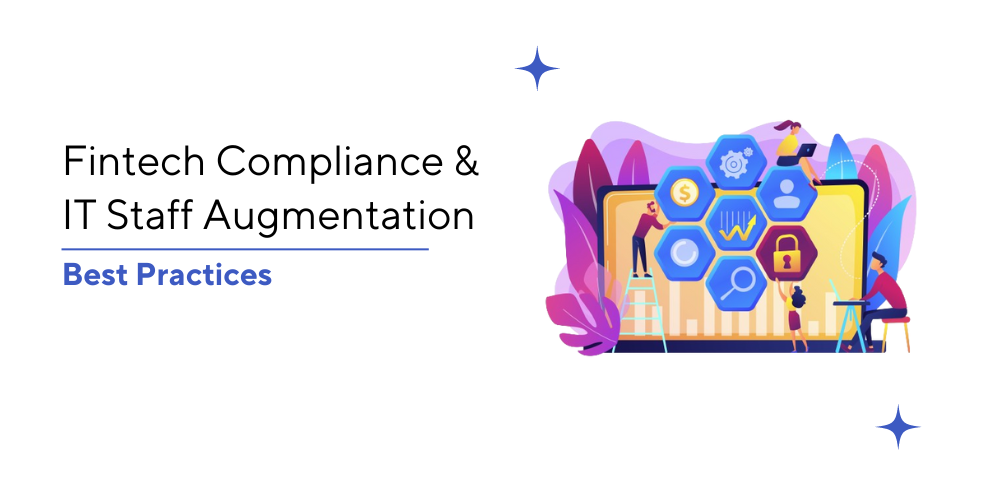As the financial industry is adopting more complicated approaches and implementing the latest technologies in solutions, adhering to industrial standards and regulatory compliance is becoming pivotal. This adherence to compliance ensures personally identifiable and financial information of users, specifically in the FinTech industries is secure and unbreachable.
In the past, many FinTech companies struggled to practice user data safety online and faced repercussions and penalties. Moreover, data theft due to a lack of responsibility can devastate a user’s life completely.
Considering this, it is crucial to plan IT team augmentation, if necessary, to assist FinTech companies stay compliant with regulatory standards without neglecting important processes or protocols. Augmented teams with specialized expertise in implementing adequate measures help protect user information and prevent FinTech institutions from the potential risks of razing their businesses down, ensuring smooth business processes continuously.
This blog will discuss the best practices FinTech companies should undertake while IT team augmentation.
Role of Staffing Augmentation in Regulating FinTech Compliances
Staff augmentation in IT and FinTech plays a significant role, as FinTech industries are highly sensitive in handling voluminous data of a sensitive nature. However, being well-versed with comprehensive FinTech compliances and regulatory standards can be rigorous practice leading to overlooking or neglecting the compliance by even major FinTech companies.
That’s when the user data safety is put at stake and potential risks arise.
Consulting staff augmentation cultivates more clarity and defines the path for FinTech companies to follow for a penalty-proof future while creating a robust security web to protect user data and financial information.
Software development and staff augmentation go hand-in-hand in today’s era of ever-evolving industrial standards where skill gaps in the in-house software development team can be filled with IT team augmentation. Traditionally, impossible, staff augmentation has significantly transformed the software development process and also enhanced compliance with regulatory requirements.
In the current epoch of technology where technological services are so accessible, hiring a software development company can easily facilitate staff augmentation services to assist business operations that go beyond the FinTech industry.
So, here we go again, explaining the best practices of staffing augmentation for FinTech compliance.
Implementing FinTech Compliance Best Practices—Mitigating Risks
Complying with FinTech standards is a strategic approach that requires diverse skills, such as a deep understanding of FinTech compliance, expertise and in-hand experience, and problem-solving abilities.
These best practices can create a risk-proof future for FinTech Companies.
In-depth Regulatory Knowledge
Both internal teams and augmented staff must have correct in-depth and comprehensive knowledge of the FinTech regulations. This ensures while the FinTech company believes they are compliant with regulatory needs, it is. Additionally, enforcing a culture of staying abreast of the latest changes is the key to updating the staff’s knowledge.
Specialized Talent Acquisition
Tech professionals with particular expertise in regulatory frameworks, FinTech compliance, and cybersecurity should be preferred over technicians with generic software development skills. This type of staffing augmentation ensures a targeted approach to implementing FinTech compliance in software solutions.
Transparent Communication Channels
Building effective channels between internal teams and augmented staffing is crucial to communicating and staying updated with the necessary compliance requirements, and policy updates, and preventing gaps in regulatory compliances. Also, building an effective channel between the development team and operations team with reliable DevOps services to implement changes in real-time is crucial.
Regular Training Programs
Foster a work culture where internal teams and augmented staff undergo training programs regularly to boost their knowledge and enhance their analytical skills to implement the changes in solutions without lacking software functionalities. Evolving industrial best practices and regulations should give rise to evolved and secure FinTech solutions.
Following Processes and Protocols
The FinTech solution development should encompass well-documented processes and protocols to clearly define the roles and responsibilities of team members, including internal and augmented teams. It also ensures the processes followed and actions implemented are aligned with the compliance procedures. For instance, API integration services follow thorough API documentation, defining protocols, terms, and processes to facilitate easy API integration and eliminate unauthorized access.
Security Measures and Data Protection
Prioritizing cybersecurity and protecting sensitive financial data from breaches and thefts through robust security measures is the cornerstone of complying with FinTech industrial regulations. Ensuring the augmented staff is well-versed with data protection protocols, encryption standards, and security practices should be the key emphasis of a FinTech company.
Regular Compliance Audits
Regular audits are crucial to analyze the effectiveness of implemented processes. This proactivity identifies and rectifies the gaps and issues created by regulatory non-compliance. It also mitigates risks before they escalate.
Integration of Compliance into Development Lifecycle
Integrating the compliance considerations into the SDLC (Software development lifecycle) to ensure the necessary compliance checks are incorporated at each stage of the project development without incurring disruption in the development process for regulatory requirements.
Cultural Integration
Fostering a culture of compliance within the organization to cultivate a sense of shared commitment to compliance standards and collectively maintaining the cohesive and aligned adherence to regulatory standards in the FinTech industry.
Stay Informed About Global Regulations
Technicians hired through IT staff augmentation should be highly aware and sensitive to the changes occurring in the regions where FinTech solutions operate. Practicing and incorporating regulatory compliances implemented in geographical areas and staying updated with region-specific standards are pivotal to ensuring ongoing services across the globe.
Conclusion
These best practices are crucial to ensure that fintech compliances are met without creating rifts due to non-compliance. FinTech institutions can leverage IT staff augmentation services and enhance their compliance by establishing effective internal and external team collaboration. Also, the future times will be more challenging as advanced technology and online storage of user data will have to be secured from cyber thefts by adhering stringently to FinTech compliances.


